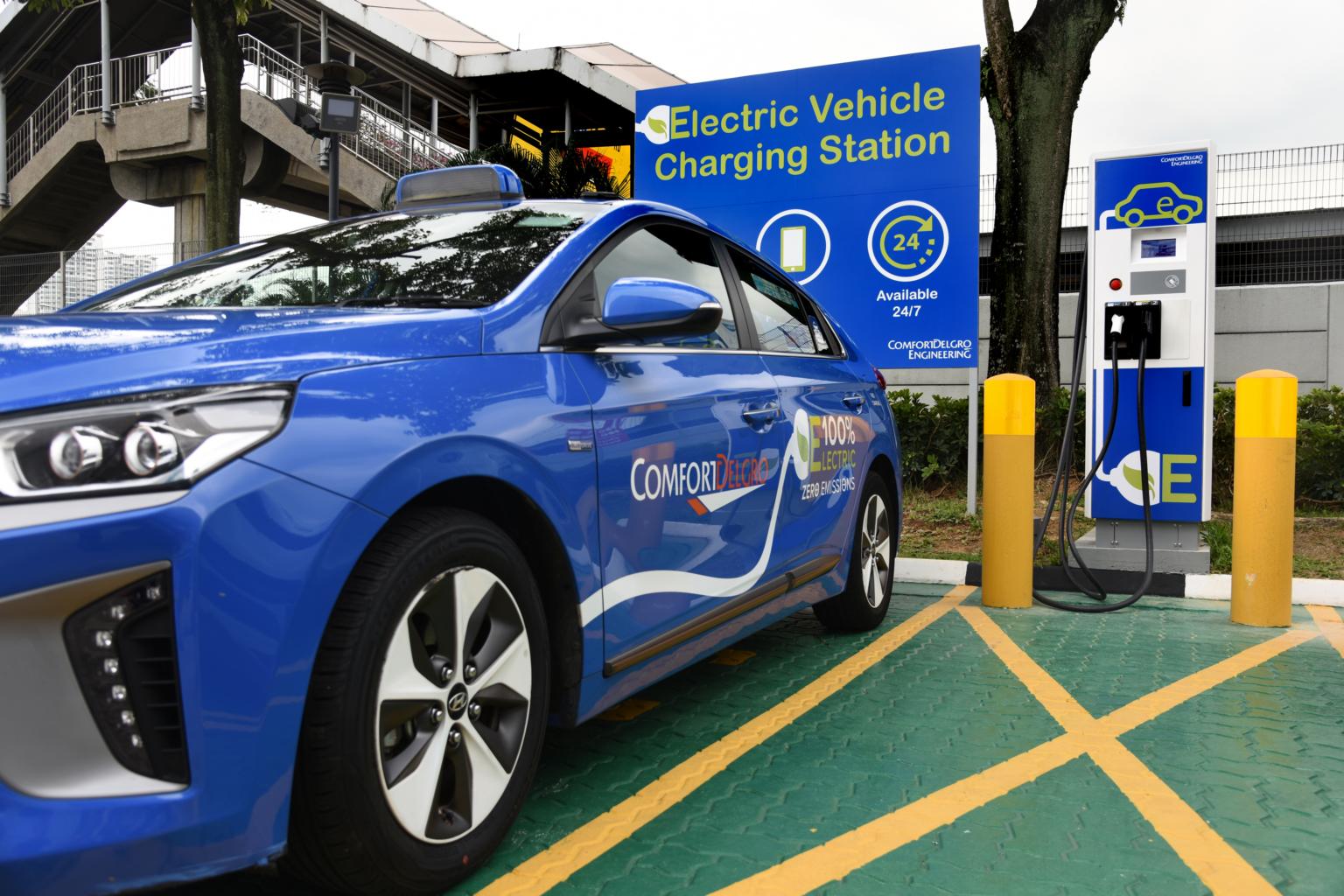Budget debate: Lifespan of electric cabs extended to 10 years, up from current 8 years
Sign up now: Get ST's newsletters delivered to your inbox

ComfortDelGro aims to have up to 1,000 electric taxis in Singapore by the end of next year.
PHOTO: COMFORTDELGRO TAXI
Follow topic:
SINGAPORE - Taxis that run on batteries will be allowed to ply the roads for 10 years, up from eight currently, in a move to support a new goal of electrifying half of the taxi fleet here by 2030.
Meanwhile, at least one in two public buses here will also go electric by 2030 as Singapore makes a major push for green transport.
To reduce both emissions and energy costs, a tender will be called later this month to install solar panels on top of new and existing land transport infrastructure, including overhead bridges, covered walkways and rail and bus depots, said Transport Minister S. Iswaran on Tuesday (March 8).
These measures will help to cut land transport sector emissions to 1.54 million tonnes of carbon dioxide equivalent by around 2050 - a reduction of about 80 per cent from peak greenhouse gas emission levels in 2016.
This new target is aligned with Singapore's more ambitious aim of achieving net zero emissions by mid-century.
During a debate on the Government's sustainability plans, Mr Iswaran said land transport is Singapore's third largest source of greenhouse gas emissions, accounting for 15 per cent of the national total.
The point-to-point transport sector, which refers to taxis and private-hire cars, is key to reducing emissions as these vehicles clock a much higher daily mileage compared to the average private vehicle, he added.
Extending the statutory lifespan of electric taxis by two years will enable taxi operators to optimise their investments and price rentals competitively, he said, noting that car batteries may need to be replaced around the five-year mark.
Taxi operators here have already started to electrify their fleets, he said, adding that their commitment to have at least half of the 15,000 cabs here run on batteries by 2030 is a significant move.
SMRT's Strides Taxi, which has a fleet of about 1,800 cabs, rolled out 300 fully electric MG5 electric cabs last year and plans to be fully electric by 2026.
ComfortDelGro, Singapore's largest taxi operator with about 9,000 cabs, will roll out up to 400 electric taxis this year, and aims to have up to 1,000 electric taxis here by the end of next year.
For private-hire cars, half of the fleet owned by ride-hailing giant Grab's rental arm, GrabRentals, will also go electric by 2030.
From March 14, commuters will be able to turn on a feature in the Grab app to prioritise electric or hybrid vehicles that emit less than 125g of carbon dioxide per km when looking for a ride.
It aims to make this a default by the end of the year, Grab said in a separate statement.
Mr Iswaran said the LTA will continue to work closely with private-hire car operators to increase electric vehicle adoption.
At the same time, the number of electric buses here is set to increase from the 60 electric buses today to about 3,000 by 2030. This will make up about half of the 5,800 public buses in Singapore currently.
LTA will achieve this by primarily purchasing electric buses from now onward.
Mr Iswaran said LTA will replace more than 400 diesel-powered buses with fully electric ones by 2025. More electric buses will be added as diesel buses that reach their statutory lifespan of 17 years are replaced.
This is a significant step up from earlier targets of having all public buses run on cleaner energy by 2040, and having all new public bus purchases either be fully electric or hybrid models.
To further green public transport infrastructure here, LTA said it will install solar panels on various buildings and structures, including its offices and the upcoming Integrated Train Testing Centre (ITTC) in Tuas.
In all, the LTA expects to contribute solar capacity of up to 45 megawatt-peak (MWp) to the national grid by 2030.
Mr Iswaran said Singaporeans can make a difference with the commuting choices they make, noting how taking an electric bus will cut one's carbon footprint by 70 per cent compared with driving an internal combustion engine car.
"We must act now, individually and collectively, by making responsible choices and trade-offs to avert a tragedy of the commons and prevent grave harm to our environment," he added.

